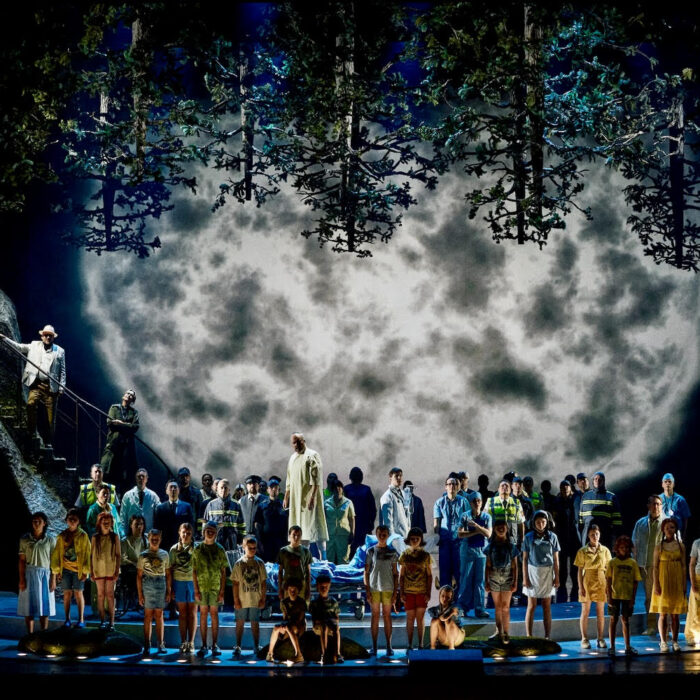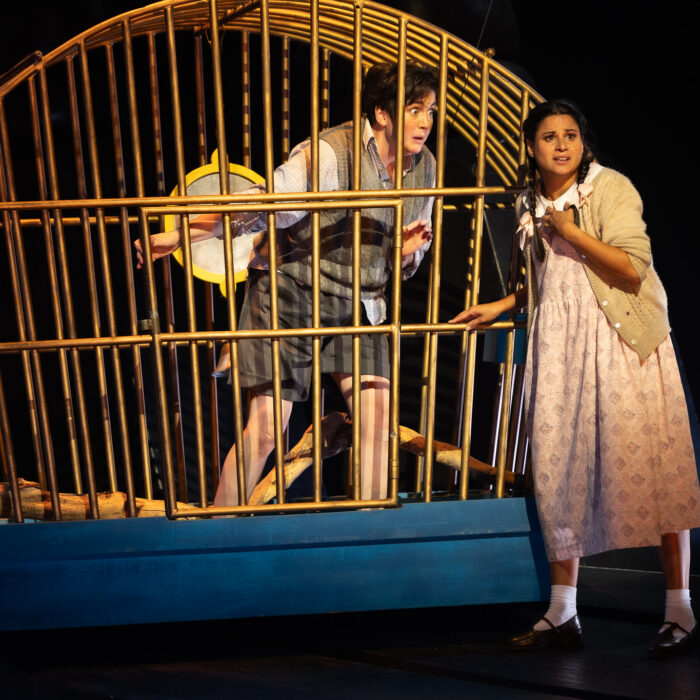
Bayerische Staatsoper 2024-25 Review: Manon Lescaut
By Lois Silverstein(Credit: Geoffroy Schied)
“Manon Lescaut” at the Bayerisches Staatsoper in April showed two soloists who brought a fresh take on Puccini’s well-loved third opera. Although Hans Neuenfels’ production kept its piquant perspective, soprano Joyce El Khouri, performing instead of Ermonela Jaho, and tenor Saimir Pirgu performed with more modesty and ardor than anticipated. They showed us once again how Puccini rivals so many opera composers who believe that opera has only one or two ways to show us romantic love and loyalty. As if coming from different worlds, the two lovers joined at the end in a mutually sincere and caring display devotion that made the opera quite moving. It was a tasteful surprise.
El Khouri, who performed at the Opera Comue and Rouen this season and previously in the Royal Opera House Covent Garden and Teatro Real Madrid, sang Manon as if she herself was surprised by her own power. Opening as a shy, young, and inexperienced maiden about to be sacrificed to the convent life against her will, she gradually discovers much about herself through her love for Renato des Grieux and her appeal to other men who seek her for their own aggrandizement. What stood out in El Khouri’s interpretation was her gradually dawning awareness of herself in the world and the necessity of being more conscious of how she affected others. Perhaps her acceptance of herself as a loving human being made her more loving toward des Grieux. Her famous aria, “Sola, perduta, abandonata” came across without self-pity or self-idolization. She has become a worthy tragic heroine at the finale, tender and sensitive to her beloved and aware that she has led herself to misfortune and tragic death.
This is substantially different from El Khouri’s dramatization of the younger and more-naïve Manon, who appears more one-dimensional: somewhat stiff and awkward and leaving us hungry for more embodiment of the character. What we see and hear in the finale is only hinted at in her first appearance in Amiens, and then in her tawdry scenes with her brother, sung by Daniel Luis de Vicente, and Geronte de Revoir, sung by Martin Snell. Here, El Khouri’s actions were somewhat stilted and contrived. It paired well, however, with the near-numbness she experienced when her beloved des Grieux appeared and surprised her. Neuenfels made it clear in his production, of course, that this was no pretty little reunion. It had bite and bitterness and sawed off any sentimental notions that we may have retained for sweet love games. It was also perfect foreshadowing for the lovers’ demise after their deportation.
Des Grieux, as performed by Pirgu, substituting for Yusif Ezarov, seemed strained at the outset too, both in voice and acting style. It was as if he were trying too hard to be the dashing cavalier who falls in love at first sight but who really does not. It was hard to believe he even wanted to be there. Even the gambler who came charging in to retrieve his lost love was flat and unbelievable as the ardent lover. However, his voice and his ease onstage grew over the course of the evening. By the finale he was ardent and sincere. Here was a des Grieux who did not want to lose the woman he loved. His voice grew fuller and richer and his gestures filled out into a man who loved and believed it—and so did we.
The orchestra under Marco Armiliato was a little faster than the soloists in the beginning, being somewhat out of sync. This perhaps contributed to the more jerky movements, being less lyrical than what traditionally characterizes Puccini’s score. It was discouraging until the ship preparation scene, and, of course, the arrival in Louisiana. Then the orchestra and the voices came together and the ‘lostness’ of earlier was replaced by the ‘lostness’ of the lovers in the ‘peaceful’ land, as Manon called it—a land where they did not even have water to drink. Armiliato came into his own then, the story melted through all boundaries, and we forgot all the despair of before. Instead we had big love, big disappointment, big tragedy, and she dies in his arms filled with their unconditional love for one-another. A perfect case of ‘romance a la mode.’
Neuenfels’ production kept the satiric jabs throughout. We were not allowed to fall into the old childhood romantic fantasy: not a chance, with clown-like, ungainly girls in curly Raggedy Ann wigs and pear shaped trousers, while others dressed in magenta velvet as they critiqued Manon for her wayward ways. Furthermore, the raunchy sexual play of the two men in front of de Revoir and Manon did little to gratify either real eroticism or satiric deflation. As the erotic gestures remained imitative, they fortified the dramatic emphasis on love itself being ‘apart’ from the crass pornography that objectified it. This production sometimes lost the balance between fine critique and carelessness: it righted itself, however, over and over.
The projected text, apparently taken from Abbé Prevost, was only in German, with no translation or translated paraphrase offered. For whom was this exclusivity intended? Furthermore, the selections were longer than needed and did little to develop a more serious connection between the lovers and what they were struggling with. Nowhere was a link between projected text and onstage drama believably made.
The evening was mixed, the ending touching, the singing moving, and Puccini once again redeemed. It is regrettable that there was a period in the 20th century when he was ‘put down’ in the US for being too feeling, too romantic, and insufficiently sophisticated. It has taken many years before serious performers can embrace his roles and significant productions can be made from the depths of Puccini’s love and passion, and his stories that resonate especially with the young at heart. Here was one attempt, which worked well, particularly when the production’s middle-of-the-road execution were dropped and the two lovers were able to really sing and cut loose from all the extras that were most ‘extra’ indeed.


